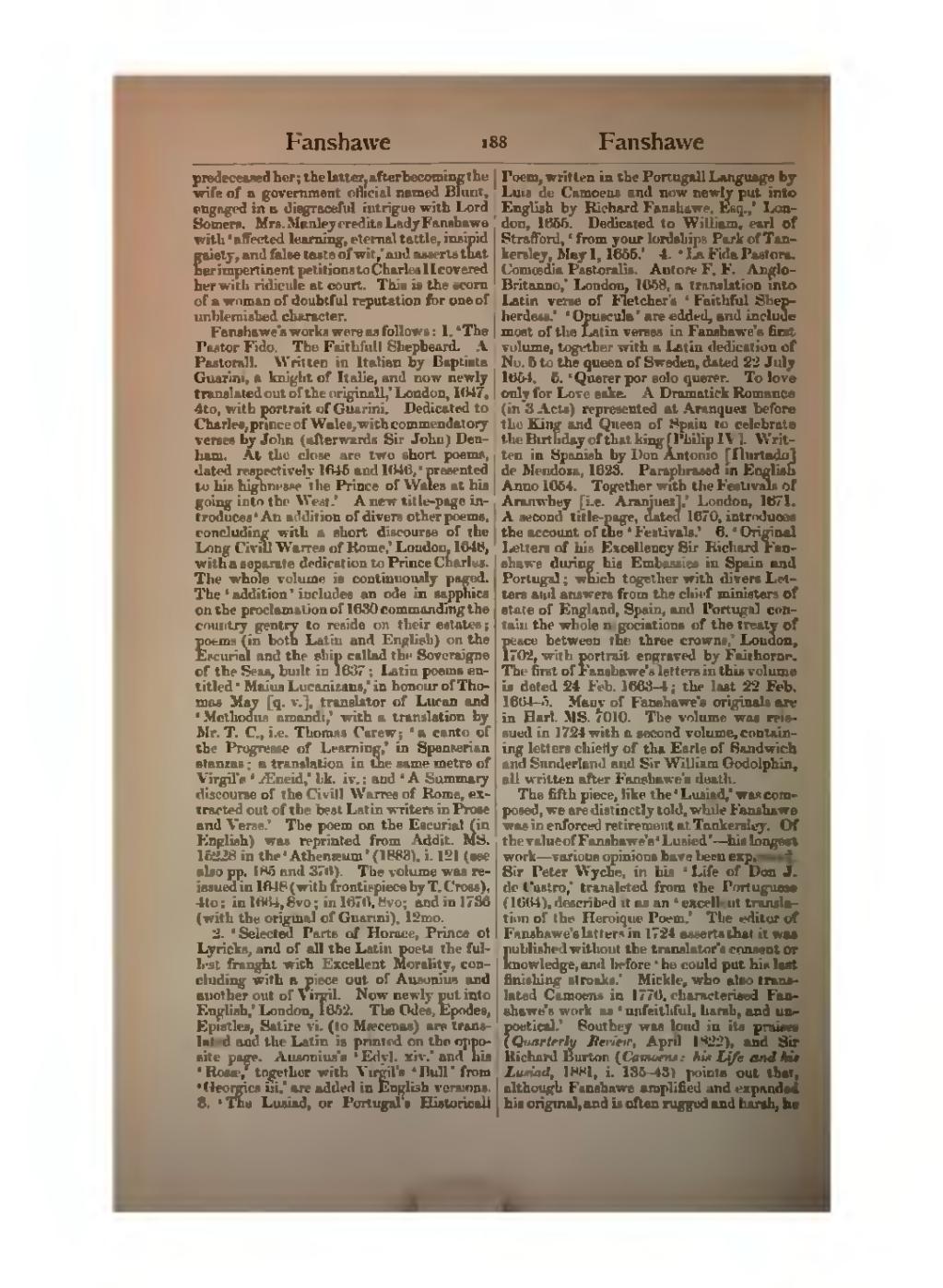predeceased her; the latter, after becoming the wife of a government official named Blunt, engaged in a disgraceful intrigue with Lord Somers. Mrs. Manley credits Lady Fanshawe with ‘affected learning, eternal tattle, insipid gaiety, and false taste of wit,’ and asserts that her impertinent petitions to Charles II covered her with ridicule at court. This is the scorn of a woman of doubtful reputation for one of unblemished character.
Fanshawe's works were as follows: 1. ‘The Pastor Fido. The Faithfull Shepheard. A Pastorall. Written in Italian by Baptista Guarini, a knight of Italie, and now newly translated out of the originall,’ London, 1647, 4to, with portrait of Guarini. Dedicated to Charles, prince of Wales, with commendatory verses by John (afterwards Sir John) Denham. At the close are two short poems, dated respectively 1645 and 1646, ‘presented to his highnesse the Prince of Wales at his going into the West.’ A new title-page introduces ‘An addition of divers other poems, concluding with a short discourse of the Long Civill Warres of Rome,’ London, 1648, with a separate dedication to Prince Charles. The whole volume is continuously paged. The ‘addition’ includes an ode in sapphics on the proclamation of 1630 commanding the country gentry to reside on their estates; poems (in both Latin and English) on the Escurial and the ship called the Soveraigne of the Seas, built in 1637; Latin poems entitled ‘Maius Lucanizans,’ in honour of Thomas May [q. v.], translator of Lucan and ‘Methodus amandi,’ with a translation by Mr. T. C., i.e. Thomas Carew; ‘a canto of the Progresse of Learning,’ in Spenserian stanzas; a translation in the same metre of Virgil's ‘Æneid,’ bk. iv.; and ‘A Summary discourse of the Civill Warres of Rome, extracted out of the best Latin writers in Prose and Verse.’ The poem on the Escurial (in English) was reprinted from Addit. MS. 15228 in the ‘Athenæum’ (1883), i. 121 (see also pp. 185 and 376). The volume was reissued in 1648 (with frontispiece by T. Cross), 4to; in 1664, 8vo; in 1676, 8vo; and in 1736 (with the original of Guarini), 12mo.
2. ‘Selected Parts of Horace, Prince of Lyricks, and of all the Latin poets the fullest fraught with Excellent Morality, concluding with a piece out of Ausonius and another out of Virgil. Now newly put into English,’ London, 1652. The Odes, Epodes, Epistles, Satire vi. (to Mæcenas) are translated and the Latin is printed on the opposite page. Ausonius's ‘Edyl. xiv.’ and his ‘Rosæ,’ together with Virgil's ‘Bull’ from ‘Georgics iii,’ are added in English versions. 3. ‘The Lusiad, or Portugal's Historicall Poem, written in the Portugall Language by Luis de Camoens and now newly put into English by Richard Fanshawe, Esq.,’ London, 1655. Dedicated to William, earl of Strafford, ‘from your lordships Park of Tankersley, May 1, 1655.’ 4. ‘La Fida Pastora. Comœdia Pastoralis. Autore F. F. Anglo-Britanno,’ London, 1658, a translation into Latin verse of Fletcher's ‘Faithful Shepherdess.’ ‘Opuscula’ are added, and include most of the Latin verses in Fanshawe's first volume, together with a Latin dedication of No. 5 to the queen of Sweden, dated 22 July 1654. 5. ‘Querer por solo querer. To love only for Love sake. A Dramatick Romance (in 3 Acts) represented at Aranquez before the King and Queen of Spain to celebrate the Birthday of that king [Philip IV]. Written in Spanish by Don Antonio [Hurtado] de Mendoza, 1623. Paraphrased in English Anno 1654. Together with the Festivals of Aranwhey [i.e. Aranjuez],’ London, 1671. A second title-page, dated 1670, introduces the account of the ‘Festivals’. 6. ‘Original Letters of his Excellency Sir Richard Fanshawe during his Embassies in Spain and Portugal … with divers Letters and answers,’ London, 1702, with portrait engraved by Faithorne. The first of Fanshawe's letters is dated 24 Feb. 1663–4; the last 22 Feb. 1664–5. The volume was reissued in 1724 with a second volume, containing letters chiefly of the Earls of Sandwich and Sunderland and Sir William Godolphin, all written after Fanshawe's death. Many of Fanshawe's originals are in Harl. MS. 7010, which contains other letters by him, printed for the first time in the 1905 edit. of Lady Fanshawe's ‘Memoirs,’ pp. 235 sq.
The fifth piece, like the ‘Lusiad,’ was composed, we are distinctly told, while Fanshawe was in enforced retirement at Tankersley. Of the value of Fanshawe's ‘Lusiad’—his longest work—various opinions have been expressed. Sir Peter Wyche, in his ‘Life of Don J. de Castro,’ translated from the Portuguese (1664), described it as an ‘excellent translation of the Heroique Poem.’ The editor of Fanshawe's letters in 1724 asserts that it was published without the translator's consent or knowledge, and before ‘he could put his last finishing stroaks.’ Mickle, who also translated Camoens in 1776, characterised Fanshawe's work as ‘unfaithful, harsh, and unpoetical.’ Southey was loud in its praises (Quarterly Review, April 1822), and Sir Richard Burton (Camoens: his Life and his Lusiad, 1881, i. 135–43) points out that, although Fanshawe amplified and expanded his original, and is often rugged and harsh, he
